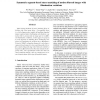Free Online Productivity Tools
i2Speak
i2Symbol
i2OCR
iTex2Img
iWeb2Print
iWeb2Shot
i2Type
iPdf2Split
iPdf2Merge
i2Bopomofo
i2Arabic
i2Style
i2Image
i2PDF
iLatex2Rtf
Sci2ools
136
click to vote
ICPR
2008
IEEE
2008
IEEE
Symmetric segment-based stereo matching of motion blurred images with illumination variations
Most existing methods of stereo matching focus on dealing with clear image pairs. Consequently, there is a lack of approaches capable of handling degraded images captured under challenging real situations, e.g. motion blur is present and an image pair is in different illumination conditions. In this paper we propose a novel approach to handling these challenging situations by formulating the problem into a Maximum a Posteriori (MAP) estimation framework, and adopt a segment-based symmetric stereo matching method to infer a mask of disparity map which indicates whether a disparity is affected by motion blur and estimate the disparity value. The experimental results show that our stereo matching method is able to compute more accurate disparity maps of this type of degraded images.
Related Content
| Added | 30 May 2010 |
| Updated | 30 May 2010 |
| Type | Conference |
| Year | 2008 |
| Where | ICPR |
| Authors | Wei Wang, Yizhou Wang, Longshe Huo, Qingming Huang, Wen Gao |
Comments (0)

